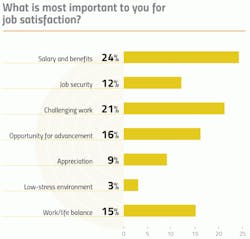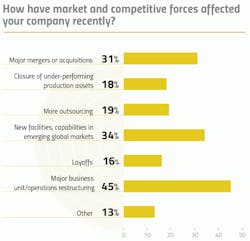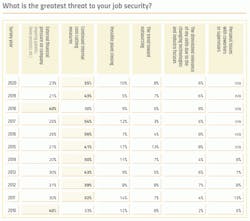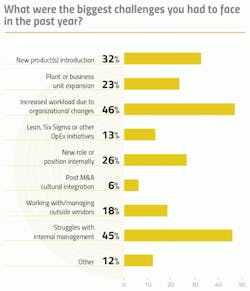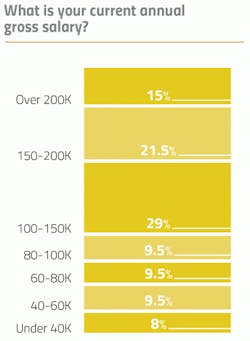Satisfaction stays stable
Year after year, survey after survey, the level of overall job satisfaction in pharma stays remarkably consistent. While it peaked slightly last year (about 91 percent reported their satisfaction levels within the range of “OK” to “very high”), this year still saw 89 percent in that same range. Even more impressive, over half of respondents rated their job satisfaction level as “very high” or “high.”
The results do not vary much along gender lines, with women trending only slightly higher than men. Geography wasn’t a big factor either – respondents from all over the globe reported similar satisfaction, with Asia reporting slightly higher levels.
Compensation could be a contributor, however. The survey found that 62 percent of those reporting “very high” to “high” satisfaction are making over $100,000.
Keeping pharma happy
For the first time in the last decade of surveys, when asked what is most important to job satisfaction, respondents did not rank “challenging work” as the highest factor. This year, 24 percent said “salary and benefits,” while 21 percent attributed happiness to challenging work.
These results were expanded on by a write-in question that asked respondents to elaborate on what satisfies them most about their current position. Several themes emerged in the responses. Trending keys to job happiness included:
Positive work environments. Many respondents noted their satisfaction with day-to-day operations as well as with their coworkers. “Fellow workers display collaboration and respect for each other,” said one respondent. “I like and trust the people I work with,” said another.
Diversity of work. Respondents noted that varied duties keep their minds stimulated. Several commented that “every day is different.” “The overall scope of work is varying and different from day to day,” said one respondent.
Stimulating work. Many respondents mentioned their appreciation for the challenges that come with developing and manufacturing new products and exploring new work processes. One respondent said what satisfies them most is how the job “stretches my brain to its max.” “I love the challenges that we encounter; like solving a giant puzzle,” noted another respondent.
Rewarding work. Respondents found satisfaction in the knowledge that their work has a direct impact on patients. Cutting right to the heart of the matter, one respondent said, “The products we make actually help sick people.”
But the editor’s choice award for the best answer to the question, “What satisfies you most about your current position?” goes to the individual who answered: “It is not killing me.” (We’ve all been there.)
Market pressures
No career is without its challenges. We asked respondents how market and competitive forces have affected their companies recently, and though varied, many of the responses appear to be interrelated. To deal with rising drug development and operational costs, many pharma companies have been restructuring their businesses. This restructuring can lead to an increase in outsourcing as well as business units being merged or sold. Survey results reflect all of these forces.
The No.1 issue each year of the survey has been “major business unit or operations restructuring.” This year’s survey also noted a small increase in companies affected by outsourcing, as well as a larger increase in those being affected by mergers and acquisitions. (This year, 31 percent reported being affected by M&A, which is up from last year’s 25 percent.)
The uptick in responses citing pressure from M&A is not surprising, coming off of a year that has been dubbed “the year of mega merger” in pharma. The industry saw sizable M&As in 2019, including Bristol-Myers Squibb’s $74 billion takeover of Celgene, AbbVie’s $63 billion Allergan acquisition and Takeda Pharmaceutical’s $62 billion deal with Shire.Job stressors
The market and competitive pressures mentioned have invariably manifested into worries about job security. While the level of anxiety has risen slightly from last year’s survey (this year, 34 percent report being more concerned), the survey still found that close to half of respondents say their level of job security concern has not changed.
“Internal cost cutting measures” were identified as the greatest threat to job security, amassing 35 percent of responses. This was followed by 23 percent of respondents naming “external financial pressure on my company due to expiring patents or circumstances surrounding failed product development or regulatory approval” as their No. 1 job security threat.
The percentage of those concerned with possible plant closings doubled this year (from 5 percent to 10 percent), but still remains somewhat low on the list of threats.
Cost-cutting and restructuring has taken its toll on employees, as evidenced by the 46 percent who reported “increased workloads due to organizational changes.” Explained one respondent,“Individuals are asked to do more, and are covering the tasks that others used to do.”
Despite this, respondents appear to be managing stress quite well. When asked if they feel overly stressed at work, about one quarter of those surveyed report feeling stressed “rarely” or “not at all.” Only about 19 percent said they are stressed “most of the time.”
Biggest gripes
When asked about the biggest challenges they had to face in the past year, 45 percent of respondents cited struggles with internal management. Respondents were also given the opportunity to elaborate in an open-ended question asking what makes them least satisfied about their current position. (The most colorful portion of the survey, by far.)
Many pointed to their company’s inability to adapt to the current landscape and technology —which is a familiar gripe heard throughout the pharma industry. “[There is] a lack of focus on modernizing the manufacturing facility,” pointed out one respondent.
Some directly called out management for not keeping up. “Management’s ideas are not current and they are putting in changes that most companies implemented 20 years ago,” said one respondent. “The CEO wants to keep a paper-based manual system that is more cumbersome and burdensome when there are great software packages available to do the same type of tasks,” continued the respondent.
Others felt that management was simply out of touch in general. One respondent said what makes him least satisfied in his position is “incompetent managers who micro-manage areas they do not understand.”
Many respondents reported feeling under-appreciated, both in terms of their company’s recognition practices and compensation. About 10 percent of the write-in responses about dissatisfaction pertained to compensation and raises — or a lack thereof. “My skills and responsibilities are taken for granted. My annual salary does not reflect my skillset, responsibility level or years of service,” said one respondent.
Room to grow?
This year, 62 percent of those surveyed said they receive timely and meaningful feedback on their job performance each year — the highest percentage reported in the last five years of surveys. The feedback is undoubtedly important, as the survey found a quarter of respondents took on a new role or position internally within the last year.
But even with solid feedback, is there a path to advancement? Half of respondents said their company offers access to a formalized program of training to support business operational excellence goals. Although according to many respondents, not all programs are created equal. “There are many so-called ‘development opportunities’ but they don’t lead to anything meaningful,” pointed out one respondent.
Many more noted the lack of true advancement opportunities within their companies in the write-in portion of the survey. “I am very satisfied with my current position but there is nowhere to advance to,” said one respondent.
Show me the money
Of course, no career and salary satisfaction survey would be complete without a discussion about money. 2019 was a strong year for pharma companies. According to a ranking of top-performing stocks in 2019 compiled by Quartz, six of the top 10 firms were pharmaceutical companies. According to our survey results, this financial success translated into compensation that is not only stable, but trending higher than it was in our previous survey.This year, 29 percent of those surveyed reported gross annual salaries between $100,000-150,000, with the next largest group (22 percent) making $150,000-200,000 annually. Around 15 percent reported salaries in excess of $200,000.
All told, 66 percent of respondents are making over $100,000 per year — up from 55 percent last year.
When examined along gender lines, 67 percent of men and 60 percent of women make over $100,000. When broken down by job function, corporate management, R&D and regulatory positions prove the most lucrative, with over 80 percent of everyone in those roles reporting salaries over $100,000.
In terms of salary bumps, 67 percent said they got a raise last year. The vast majority of respondents (69 percent) got a 3-5 percent wage increase. How does this compare with other industries? According to Korn Ferry research, salaries in general grew at a rate of 5.1 percent globally in 2019 (3 percent in the U.S.).
According to our survey, about 31 percent of those who got a raise beat the global rate, reporting a 6 percent or more increase.
Mostly work, some play
Pharma’s stable compensation does not come without dedication to the job. Around 60 percent of those surveyed say they work 40-49 hours per week. And 26 percent are putting in 50+ hours each week.
Similar to the previous survey’s findings, 54 percent of respondents said they left vacation days on the table last year. In the U.S. (a nation that lacks a mandated vacation time policy) this percentage is on par with the rest of the country. Even when given vacation days, over 50 percent of Americans don’t use them all. While work/life balance continues to grow in importance for those in pharma, it still is not a high-ranking factor in job satisfaction.
Survey demographics
This year’s study yielded 265 total responses. Participants were predominately North American-based (68%), with the remainder of respondents dispersed in Europe (9%), India (8%), Asia (7 %) and the Middle East, Africa and Latin America.
This year, 71% of survey respondents were male and 29% female. The majority of respondents (77%) were 40 or older, with most possessing degrees in pharmaceutics, chemistry or chemical engineering. According to survey results, 20% work in quality assessment and QC, 22% in manufacturing and operations and 15% fill R&D rolls. Corporate management, engineering, consulting, process control and regulatory functions were also represented.
Industry longevity dominated, with 82% of responding readers having seven or more years of industry experience — and an impressive 49% of total respondents boasting more than 20 years of pharma industry experience. Interestingly enough, despite all the grumblings about management, 66% are in supervisory roles themselves, with 33% in charge of supervising five or more people.
Respondents represented the true diversity of our readership, with 16% from Big Pharma, 16% from small and mid-sized specialty manufacturers, 14% from generic pharma, 12% from contract pharma and 11% from biopharma. The remainder, including consultants, vendor/solution providers, API and excipient providers and all others, accounted for about 31% of the total.
About the Author
Karen P. Langhauser
Chief Content Director, Pharma Manufacturing
Karen currently serves as Pharma Manufacturing's chief content director.
Now having dedicated her entire career to b2b journalism, Karen got her start writing for Food Manufacturing magazine. She made the decision to trade food for drugs in 2013, when she joined Putman Media as the digital content manager for Pharma Manufacturing, later taking the helm on the brand in 2016.
As an award-winning journalist with 20+ years experience writing in the manufacturing space, Karen passionately believes that b2b content does not have to suck. As the content director, her ongoing mission has been to keep Pharma Manufacturing's editorial look, tone and content fresh and accessible.
Karen graduated with honors from Bucknell University, where she majored in English and played Division 1 softball for the Bison. Happily living in NJ's famed Asbury Park, Karen is a retired Garden State Rollergirl, known to the roller derby community as the 'Predator-in-Chief.'

